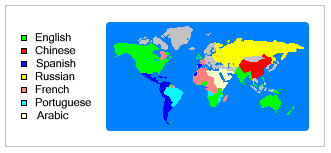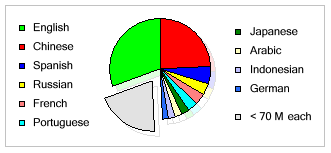| |
|
|
|
About 15% of all adult language learners state holidays as their primary
motivation for studying. Needless to say: you will enjoy your travel abroad the more the more knowledge you have
about the foreign language. But, moreover...
|
-
|
|
People from other cultures can open your mind to new ideas and views. If
you hesitate, remember what you thought about diving before you learned to swim. |
|
-
|
|
For some reason, during holidays, romance seems to come up easier :-) |
|
-
|
|
Sorry to say this: safety is an issue in some places. If you don't stand
out as a foreigner, you are less likely to be robbed or something worse... |
At home, your language skills may also prove helpful. For example, you may have to help an immigrant or a tourist
in trouble.
What language should you choose? The following map shows the areas of influence of the major "world languages". (NB In
parts of Northern Africa covered by French and Spanish on this map, Arabic is actually more important.)

|
| |
|
|
|
Some reasons for learning a second language:
|
-
|
|
Being able to read scientific publications in their original versions makes it easier to
be up-to-date. |
|
-
|
|
Learning a complex language trains your logical
and critical thinking skills. Latin and Old Greek are typical
examples: paradoxically, a solid knowledge of classical languages is a better preparation for scientifical studies
than certain foolproof, rule-based mathematical textbooks in use today. |
|
-
|
|
Some people learn ancient languages for religious
motivations: Christian theologians study koiné Greek,
Muslims learn classical Arabic, Thai Buddhists study Pali. |
|
-
|
|
And, last but not least, learning a foreign language makes you understand your mother tongue
better. You will find many opportunities to contrast both languages. |
What language shall you choose? For reading scientific literature, the answer is relatively simple. About half
of all scientific publications in humanities translated into other languages were originally written in English,
the other half being shared by works first published in German, French, or Russian. The figures for natural sciences
and technology are not likely to be much different.

For some disciplines, certain languages are more important than others.
For example, in western psychology and philosophy German is essential, and Russia is still a world power in mathematics.
For literary studies or leisure, consider the languages with a long written tradition: Chinese, English, French,
German, Japanese, Russian, Spanish, Farsi (Persian), ...
|
| |
|
 |
|
What do you do? Depending on your kind of activity, you will need a different
language and a different level of proficiency.
|
-
|
|
If your company does business with other countries, foreign language skills
will allow you to have a more direct relationship with your customers. |
|
-
|
|
Your career opportunities within a company may depend on your language skills. For example, in the German
branch of Daimler-Chrysler (Mercedes-Benz), the meetings of high executives are held in English. On the other hand,
large companies often require employee mobility. |
|
-
|
|
Migration: If you are
a citizen of the European Union, you have the right to live and work in any country of the Union for unlimited
time. But you can take advantage of this chance only if you have appropriate language skills. |
|
-
|
|
In today's constantly changing labor market, a high educational standard proves decisive
for adapting to new situations. |
Now, which languages prevail in business contacts? The following graph shows an estimation of the population living
in the areas of influence of major languages. Note that in business, certain widely spoken languages are replaced
by a "world language" (e.g. Hindi by English).

Consider the following factors as well:
|
-
|
|
Do you want to sell or buy? China and India have a big growth potential
due to their population, but check UNESCO's Human
Development Index to see which territory your future clients
are likely to be living in. |
|
-
|
|
Which countries or ethnic groups will you deal the most with? For instance, Germany is the largest trade partner of the
USA; the largest minority in the USA are Hispanics (est. 30 million). |
|
-
|
|
Note certain minorities have a greater purchasing power (e.g. ethnic Chinese
in Singapore (74%), Malaysia (34%), Thailand (8%), and Indonesia (3%)). |
For statistics comparing countries as per various criteria, see http://www.nationmaster.com
|
| |
|
|
|
In regions such as the European Union, foreign language knowledge will be
increasingly essential for being able to participate in decision making at various political levels. It is not
likely that a single official language will be adopted in the near future in the EU. Anyway, multilingualism is
no Utopia: in countries such as Luxembourg or Switzerland, it has been taken for granted for centuries.
Reversely, national unity can be promoted by spreading the knowledge of minority languages (French in Canada, Spanish
in the US). |

